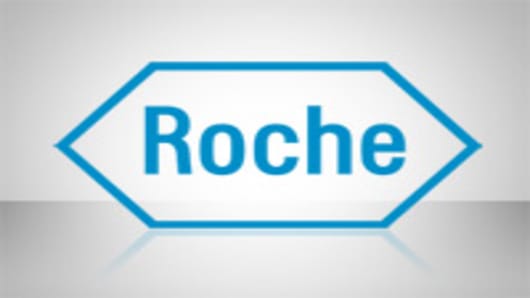The buyout offer from Swiss drug giant Roche has shares of DNA trading at their highest level in about two-and-a-half years and according to CNBC stock-stat maven, Robert Hum, if they close up at least 8.88% it'll be their biggest one-day percentage gain since April 15, 2005.
The stock went up 18 percent that day after the biotech company announced positive test results on its cancer drug Avastin. Investors are bidding up the shares way beyond the $89 Roche is offering. Roche officials say the amount is "fair and generous", but many analysts say it ain't even close.
Late this morning on a conference call for clients (it was a few minutes late getting started because so many people were calling in and there were so many questions that the analyst scuttled plans to also spend half the time talking about Gilead Science'searnings), Deutsche Bank's Mark Schoenebaum at first said he thinks Genentech "shareholders will demand something close to 100 dollars."
Then, during the question and answer period, Schoenbaum read an email from one client who phrased a question like I would: "Does the deal get done? Yes or no? And, if so, at what price?" Both Schoenbaum and his colleague in London, Michael Leuchten, who covers Roche agreed the deal gets done. This time, though, Schoenbaum hedged a little and forecast a range of $95 to $105 a share. While Leuchten said, "Around $100 is not a silly assumption."
DB owns at least one percent of Roche shares which, by the way, trade on the Swiss exchange and over the counter in the U.S. It has also banked the company and wants to do it again soon. Perhaps very soon. DB also owns at least one percent of DNA and wants to do investment banking for the company.
But in a strongly-worded research note to clients, Sanford C. Bernstein's Geoffrey Porges, says the deal could backfire--and that's his word. Yes, he is raising his DNA price target to $101, but he adds that he "potentially sees scenarios in which the deal is not completed at all, although that seems unlikely." If it does get done Porges writes that it "causes an irrevocable breach in relations between Genentech and Roche. If this deal closed, we believe Roche will be judged in the future to have killed one of the great research entities in the industry's history, and the golden goose that has fueled much of Roche's growth in an effective and symbiotic way." A part of Bernstein owns at least one percent of DNA.
Whatever happens there, the offer is having a ripple effect throughout the biotech sector. All of the usual takeout suspects are trading higher: Biogen Idec, Gilead Sciences, Celgene, Amylin Pharmaceuticals,ImClone Systems, just to name a handful.
Meantime, investors in Merck and Schering-Ploughwere spooked by the companies taking what Miller-Tabak healthcare analyst Les Funtleyder calls the "highly unorthodox" move of delaying their earnings releases at the last minute. They were supposed to report this morning, but now they'll come out after the closing bell.
That's to allow doctors in London announce the results of another Vytorin study, this one known as SEAS (Simvastatin plus Ezetimibe in Aortic Stenosis). Simvastatin is Zocor, Ezetimibe is Zetia and aortic stenosis is narrowing of a major heart valve. Zocor and Zetia are combined to make Vytorin. Stay tuned for those results around 1 pm ET.
After being accused of withholding the results of the controversial ENHANCE study of Vytorin--allegations the companies deny--I think MRK and SGP told their outside doctor/researchers not to sit on important data anymore.
Questions? Comments? Pharma@cnbc.com


